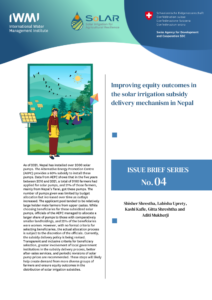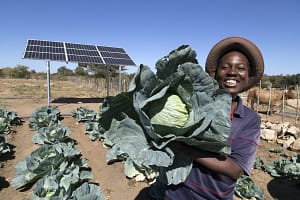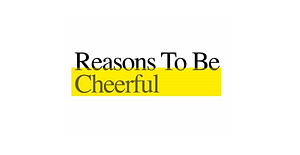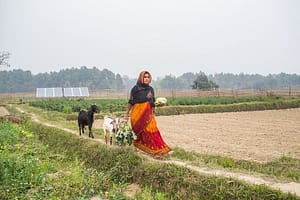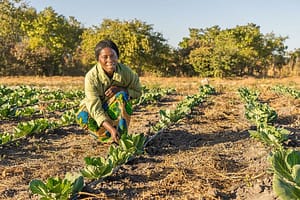This project brief highlights sustainable irrigation methods along with the potential benefits of promoting solar-powered irrigation systems in Punjab, Pakistan. To promote the broad adoption of ecologically sustainable farming methods, the brief stresses the need to create a legislative framework that gives suitable incentives to farmers to improve their living conditions and increase the variety of crops they grow. In this regard, a feed-in tariff (FIT) policy that supports solar irrigation pumps (SIPs) might reduce financial costs and the dependency on nonrenewable fossil fuels, thereby incentivizing farmers to save groundwater resources and sell power back to the grid by implementing a feed-in tariff rate of Rs. 20/kWh for SIPs in Pakistan.
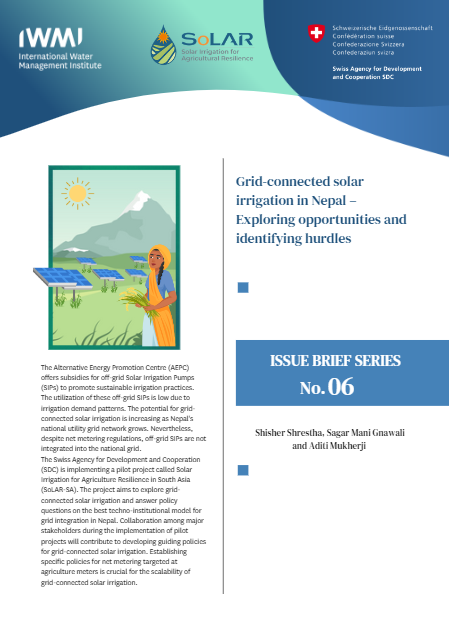 Grid-connected solar irrigation in Nepal – Exploring opportunities and identifying hurdles – 06
Grid-connected solar irrigation in Nepal – Exploring opportunities and identifying hurdles – 06
The Alternative Energy Promotion Centre (AEPC) offers subsidies for off-grid Solar Irrigation Pumps (SIPs) to promote sustainable irrigation practices. The utilization of these off-grid SIPs is low due to irrigation demand patterns. The potential for grid-connected solar irrigation is increasing as Nepal’s national utility grid network grows. Nevertheless, despite net metering regulations, off-grid SIPs are not integrated into the national grid. The Swiss Agency for Development and Cooperation (SDC) is implementing a pilot project called Solar Irrigation for Agriculture Resilience in South Asia (SoLAR-SA). The project aims to explore grid-connected solar irrigation and answer policy questions on the best techno-institutional model for grid integration in Nepal. Collaboration among major stakeholders during the implementation of pilot projects will contribute to developing guiding policies for grid-connected solar irrigation. Establishing specific policies for net metering targeted at agriculture meters is crucial for the scalability of grid-connected solar irrigation.
The increasing use of Solar Irrigation Pumps (SIPs) has raised concerns about the overexploitation of groundwater. So, this study aims to evaluate the impact of SIPs on the pumping behaviour of farmers and its subsequent effect on overall groundwater resources in Bangladesh and India. In Bangladesh, the study is being carried out in the intensively irrigated North-West region, where the government is promoting the fee-for-service model for solar irrigation. This model creates a solar irrigation command area by setting up centralized sponsored SIPs. In India, the study is being conducted in the state of Gujarat, where the grid-connected solar irrigation pump model has been implemented under the Suryashakti Kisan Yojana (SKY) scheme.
Improving equity outcomes in the solar irrigation subsidy delivery mechanism in Nepal – 04
As of 2021, Nepal has installed over 2000 solar pumps. The Alternative Energy Promotion Centre(AEPC) provides a 60% subsidy to install these pumps. Data from AEPC shows that in the five years between 2016 and 2021, a total of 9100 farmers had applied for solar pumps, and 21% of those farmers, mainly from Nepal’s Tarai, got these pumps. The number of pumps given was limited by budget allocation but increased over time as outlays increased. The applicant pool tended to be relatively large holder male farmers from upper castes. While choosing beneficiaries for these subsidized solar pumps, officials of the AEPC managed to allocate a larger share of pumps to those with comparatively smaller landholdings, and 22% of the beneficiaries were women. However, with no formal criteria for selecting beneficiaries, the actual allocation process is subject to the discretion of the officials. Currently, the subsidy delivery policy is being revised. Transparent and inclusive criteria for beneficiary selection, greater involvement of local government institutions in the subsidy delivery process, better after-sales services, and periodic revisions of solar pump prices are recommended. These steps will likely help create demand from more diverse groups of farmers and ensure equity outcomes in the distribution of solar irrigation subsidies.
The Bangladesh government plans to generate 10% of its electricity from renewable sources by 2030. The Infrastructure Development CompanyLimited (IDCOL), a nodal agency for renewable energy in Bangladesh, has so far installed 1,523off-grid solar irrigation pumps (SIPs) with 42.1megawatts (MW) capacity through an innovative fee-for-service model. These pumps have a high panel-to-pump capacity ratio to meet irrigation demands during the peak irrigation season of summer boro paddy. However, beyond the boro season, irrigation demand is limited. Over-reliance on one crop for revenue generation and low usage during the off-season affect the financial viability of SIP investments. Grid integration can offer a one-stop solution for increasing the capacity utilization of solar panels and helping the government meet its renewable energy targets by utilizing the existing solar infrastructure.
Mitigation and beyond: Multiple co-benefits of solar irrigation in Bangladesh – 02
Irrigation in Bangladesh depends primarily on imported diesel. The Government of Bangladesh (GoB) has started investing in solar irrigation pumps (SIPs) to replace diesel pumps in off-grid areas. The objective is to achieve energy security and reduce agriculture’s greenhouse gas (GHG)emissions. Results from a representative survey of farmers in the command areas of the SIPs installed by the Infrastructure Development Company Limited (IDCOL) show that beyond effectively achieving the primary objective of reducing the use of diesel (mitigation), these pumps also provide other significant benefits to the farmers. The study found that these SIPs reduce farmers’ cost of irrigation by 20% to 30%compared to diesel irrigation pumps, offer them access to less labour-intensive, time-saving irrigation services, and support their needs for supplementary irrigation in case of delayed monsoons.
Institutional modalities for decarbonizing irrigation in Bangladesh – 01
Diesel-based groundwater irrigation has been crucial in expanding dry-season boro paddy cultivation in Bangladesh. Boro paddy was, in turn, instrumental in ensuring the country’s food security. But high dependence on imported diesel is a financial burden for the government. Transitioning to clean and renewable energy sources, like solar, can alleviate the government’s fiscal burden and help decarbonize the agricultural sector. Bangladesh has promoted multiple models for the diffusion of solar irrigation pumps (SIPs), ranging from the conventional subsidy-driven models of SIP ownership to the fee-for-service model that leverages private sector investments for expanding the outreach of irrigation services. The fee-for-service model promoted in Bangladesh by the Infrastructure Development Company Limited (IDCOL) is unique in the South-Asian context for bringing public-private partnership in SIP expansion. This model also offers useful lessons for the provision of affordable irrigation to smallholder farmers in the region.
| Get to know more about the issue briefs through Doodle Animation videos |
| Suggested read |

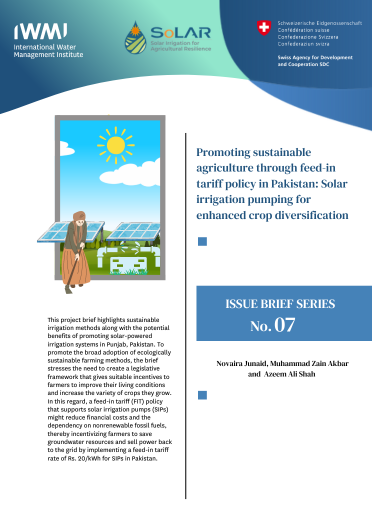 Promoting sustainable agriculture through feed-in tariff policy in Pakistan: Solar irrigation pumping for enhanced crop diversification- 07
Promoting sustainable agriculture through feed-in tariff policy in Pakistan: Solar irrigation pumping for enhanced crop diversification- 07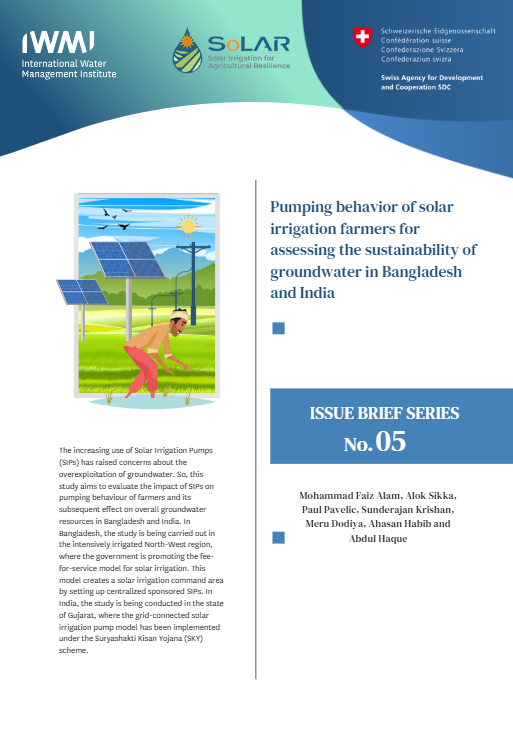 Pumping behavior of solar irrigation farmers for assessing the sustainability of groundwater in Bangladesh and India – 05
Pumping behavior of solar irrigation farmers for assessing the sustainability of groundwater in Bangladesh and India – 05 